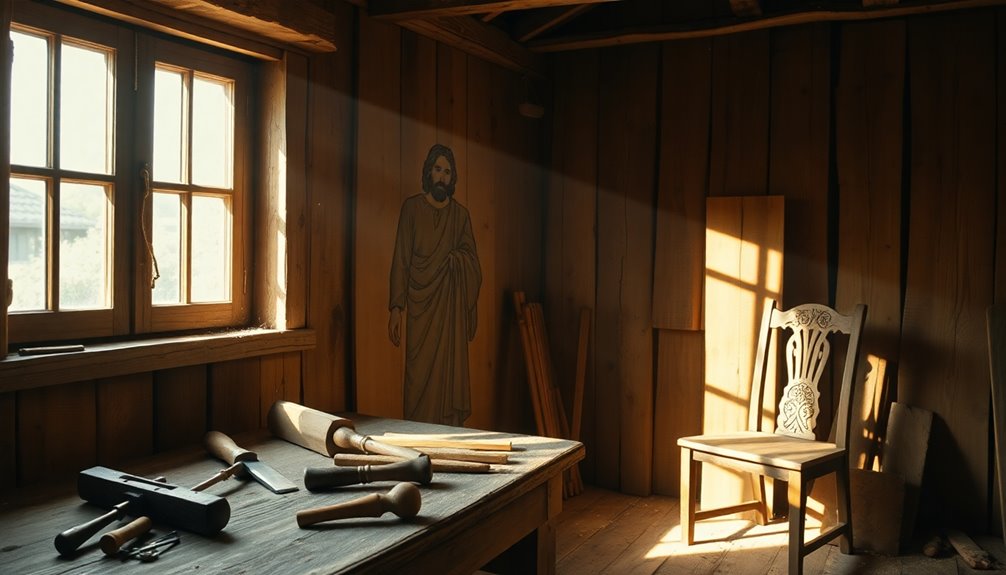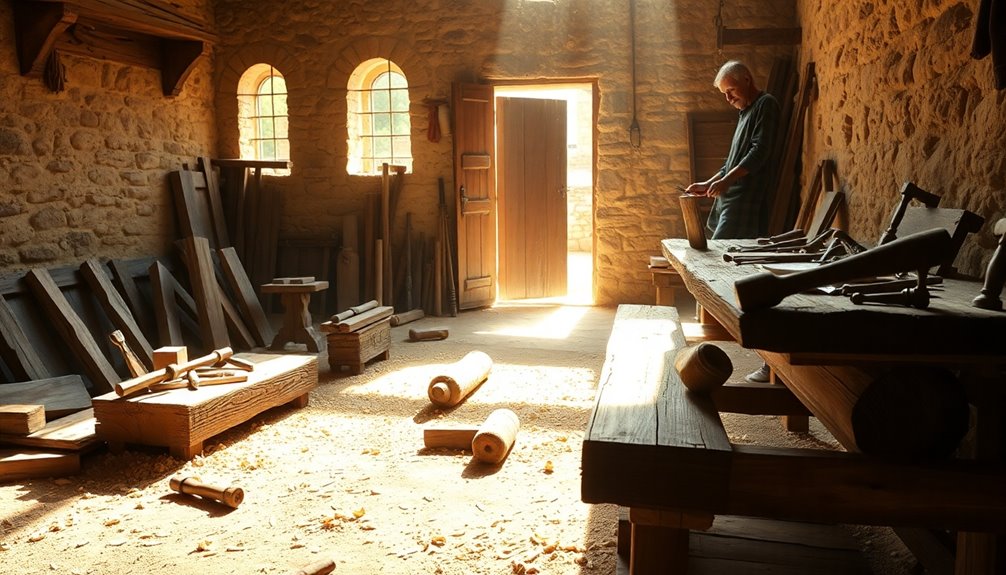You might know Jesus as a carpenter from Scripture, where He's referred to as "the carpenter" (Mark 6:3) and "the carpenter's son" (Matthew 13:55). This title hints at His upbringing in a family skilled in craftsmanship, likely involving more than just woodworking. In first-century Judea, Jesus probably engaged in stonemasonry due to local resources. His work ethic reflects His teachings, emphasizing the connection between physical labor and spiritual growth. Jesus' skills weren't just for building structures; they symbolize His mission to create and restore faith. Curious about how this craftsmanship ties into His spiritual message? There's more to uncover.
Key Takeaways
- Jesus is referred to as "the carpenter" and "the carpenter's son" in the Gospels, indicating His trade background.
- The Greek term "tekton" suggests Jesus had skills in both woodworking and stonemasonry, reflecting the demands of His environment.
- In first-century Judea, craftsmanship was essential, with skills typically passed down from fathers to sons, emphasizing familial training.
- Jesus' work ethic in carpentry symbolizes dedication and mastery, linking physical labor to spiritual growth and fulfillment.
- His craftsmanship serves as a metaphor for building community and faith, illustrating the connection between tangible work and spiritual teachings.
Introduction

Jesus' identity as a carpenter isn't just a detail; it shapes how we understand His life and teachings. When you consider Jesus as a carpenter, you're tapping into a deeper layer of His existence. Growing up in a household where Joseph was a carpenter, Jesus likely learned the skills of the trade from a young age. This upbringing wasn't merely about making furniture; it reflected the socio-economic realities of first-century Judea, where skilled labor was respected and essential for community development.
The Greek term "tekton," often translated as carpenter, suggests Jesus' work extended beyond woodworking to include a variety of crafts and building techniques. This versatility in craftsmanship highlights the importance of skill and labor in His culture.
As you explore His parables and teachings, you'll notice how frequently He incorporates themes of building, craftsmanship, and the value of hard work. Understanding Jesus in this light not only enriches your perspective on His teachings but also invites you to appreciate the practical wisdom that flowed from His experiences as a carpenter. Additionally, the concept of customization options for interiors in modern camper conversions echoes the adaptability and resourcefulness that Jesus exemplified through His craftsmanship.
It's a reminder that His lessons were rooted in everyday life, making them relatable and timeless.
Scriptural Evidence of Jesus' Profession

When you look at the Gospels, you'll find clear references to Jesus as "the carpenter" and "the carpenter's son."
These passages, along with the Greek term "tekton," hint at a broader skill set beyond just woodworking.
Let's explore both the primary and secondary biblical references that highlight Jesus' profession and its significance.
Primary Bible References
While exploring the profession of Jesus, you'll find that the Gospels provide clear references to His background as a carpenter. In Mark 6:3, Jesus is directly identified as "the carpenter," which highlights His trade in Nazareth. This reference establishes a tangible connection to His humble beginnings, showcasing how He worked with His hands before embarking on His ministry.
Matthew 13:55 further emphasizes this connection by referring to Jesus as "the carpenter's son." This phrase not only underscores His familial ties to Joseph but also reflects the socio-economic realities of first-century Galilee, where family trades were vital for survival.
These references illustrate that Jesus grew up in a household rooted in craftsmanship, potentially shaping His approach to life and leadership.
Interestingly, the term "carpenter" in the Gospels can also be interpreted through the Greek term "tekton." This broader definition may suggest that Jesus worked with various materials, including wood and stone.
Secondary Bible References
The Gospels offer additional insights into Jesus' profession as a carpenter beyond the primary references. In Mark 6:3, Jesus is explicitly called "the carpenter," highlighting His roots in Nazareth and the craft He practiced. This connection to His upbringing reinforces the notion that Jesus wasn't just a figure of spiritual authority but also a skilled worker.
Similarly, in Matthew 13:55, He's referred to as "the carpenter's son," suggesting that His family had a tradition in this trade.
The term "tekton," which appears in these accounts, broadens our understanding of Jesus' work. It can mean not only "carpenter" but also "craftsman" or "builder," indicating that His skills might've encompassed various forms of construction.
Additionally, in Mark 13:2, Jesus mentions the temple's destruction, tying His earthly profession to His prophetic role and emphasizing the significance of construction in His teachings.
These references underscore Jesus' humble origins and practical skills, reflecting the socio-economic context of first-century Judea. They invite you to appreciate the blend of His earthly work and divine mission, illustrating the depth of His character.
First-Century Jewish Craftsmanship

First-century Jewish craftsmanship was a vital part of daily life in Judea, encompassing various trades like carpentry, masonry, and stone cutting. As a craftsman, you'd likely have learned your skills through an apprenticeship, starting in early adolescence, often under your father's guidance. This hands-on experience ensured that essential techniques were passed down through generations.
The Greek term "tekton," commonly used to describe Jesus, suggests he was more than just a carpenter; he was a builder skilled in both wood and stone work. In Nazareth, where trees were scarce, it's plausible that carpenters often took on masonry tasks, constructing homes and structures primarily from the abundant local stone.
The construction techniques of the time relied heavily on simple tools and practical methods, which were essential for meeting the diverse economic needs of your community.
The craftsmanship you practiced wasn't just about creating objects; it was about building a way of life that supported your family and neighbors. By mastering your trade, you contributed to the fabric of society, ensuring that each project reflected both functionality and the artistry inherent in the work of a tekton.
Cultural Context of Craftsmanship

Craftsmanship in first-century Judea wasn't just a profession; it was a cornerstone of community life. Craftsmen played vital roles, providing essential services that supported the economy and helped shape the community.
Young men, like Jesus, learned their trades from their fathers, a reflection of the cultural norm that emphasized familial vocational training. This apprenticeship ensured that skills were passed down through generations.
In Nazareth, where trees were scarce, Joseph and Jesus likely focused more on stonework, constructing buildings that were practical and durable. The techniques they developed weren't just about creating furniture; they were about building homes and spaces that fostered community interaction.
These artisans served not only as builders but also as handymen, capable of addressing various needs within their neighborhoods. This craftsmanship not only provided physical structures but also promoted the mental and emotional benefits of a well-organized environment, enhancing community cohesion.
Understanding this cultural context enhances the significance of Jesus' teachings. His metaphors often relate to building and creation, illustrating deeper spiritual truths.
Misunderstanding Jesus' Trade Skills

You might be surprised to learn that the term "tekton," often translated as "carpenter," really means craftsman or builder, which opens up many possibilities about Jesus' trade skills.
Many people overlook the historical context of Nazareth, where stone was more abundant than wood, leading to misconceptions about his work.
Debunk Common Misconceptions
Many people assume Jesus was just a carpenter, but this perspective overlooks the broader implications of the term "tekton." This Greek word signifies a craftsman or builder, suggesting He may have worked with both wood and stone. Given that trees were scarce in Nazareth, it's likely that Jesus and Joseph focused more on masonry and stonework, utilizing the abundant local quarries.
While the Gospels mention Jesus as a carpenter only twice, this limited reference hints that His primary identity was as a teacher and healer, with carpentry being a secondary aspect of His life. Most homes in first-century Judea were predominantly made of stone, reinforcing the idea that Jesus' trade skills likely included stonemasonry.
Additionally, Jesus' teachings often emphasize craftsmanship, such as His metaphor of the cornerstone, highlighting the significance of construction skills in conveying spiritual messages.
Skepticism About Historical Accuracy
Skepticism about the historical accuracy of Jesus' trade skills often crops up due to the ambiguous nature of the Greek term "tekton." This word can encompass a range of meanings, from craftsman to builder, suggesting that Jesus' expertise likely extended beyond mere carpentry.
Some scholars argue that he may have worked as a stonemason instead. Considering the scarcity of trees in Nazareth and the region's reliance on stone for construction, this interpretation makes sense.
Moreover, Nazareth's proximity to Zippori, a city experiencing significant growth during Jesus' time, raises further questions. It's plausible that Jesus was involved in masonry work, given the demand for skilled labor in an expanding urban area.
Critics point out that viewing Jesus solely as a carpenter might overlook the socio-economic context of 1st-century Judea, where different trades could have flourished.
Ultimately, whether seen as a carpenter or a stonemason, understanding Jesus' craftsmanship is essential. It highlights the need for a nuanced perspective on his background, which could have influenced his teachings and ministry in profound ways.
Crafting Faith Through Work

When you think about Jesus as a carpenter, consider how His work ethic shapes your daily life.
Craftsmanship isn't just about building physical things; it's a way to strengthen community and share values.
Work Ethic in Daily Life
Embracing the value of hard work can transform your daily life into a canvas for spiritual growth. Just as Jesus, a carpenter by trade, exemplified a strong work ethic, you too can find purpose and fulfillment in your daily tasks. Carpentry isn't just about building physical structures; it's a reflection of dedication, skill, and mastery. By committing to your work, you mirror the craftsmanship that Jesus demonstrated.
In 1st-century Judea, young men learned trades from their fathers, instilling a sense of responsibility that shaped their lives. This cultural backdrop emphasizes that hard work is vital for personal development and spiritual maturity. When you approach your responsibilities with the same diligence, you're not just completing tasks; you're engaging in a form of worship.
Moreover, Jesus used metaphors of building in His teachings, suggesting that your everyday efforts can contribute to something greater. As you cultivate your work ethic, consider how each task serves a purpose, aligning with your faith. Additionally, embracing a strong work ethic can lead to psychological benefits, enhancing both your well-being and productivity in daily life.
Building Community Through Craftsmanship
Craftsmanship embodies the spirit of collaboration and community, drawing us together in shared purpose. Just as Jesus, the carpenter, used His skills to build not just furniture but relationships, you too can embrace craftsmanship as a means of building community. Your hands-on work reflects dedication and care, essential qualities for nurturing faith and fostering connections among fellow believers.
In Matthew 16:18, Jesus emphasizes constructing a spiritual foundation, paralleling His earthly work with building His church. By actively participating in community life, you can embody this teaching. Engage in projects that require collaboration—whether it's creating something tangible or organizing outreach efforts.
The craftsmanship you exhibit can serve as a metaphor for the relationships you cultivate. Like Jesus' parables rooted in His experiences, let your work inspire others to embody faith through action. The dedication you show in your craftsmanship not only enhances your skills but also strengthens the bonds within your community.
As you build together, you're not just creating physical structures; you're laying the groundwork for a vibrant, faith-filled community that thrives on shared purpose and collaboration.
Carpentry's Spiritual Significance Explored

Carpentry holds profound spiritual significance, reflecting Jesus' mission to create and restore. As a carpenter, Jesus embodied the act of building not just physical structures but also spiritual communities. When He spoke of building His church in Matthew 16:18, He emphasized the foundational role of craftsmanship in establishing a place for believers to gather and grow in faith.
Moreover, Jesus' promise to prepare a place for His followers in John 14:1-3 beautifully illustrates the care and intentionality that comes with the work of a carpenter. This connection between physical labor and spiritual fulfillment reveals how Jesus' experiences in construction informed His teachings on salvation and community.
By saving the lost, He showcased a deep understanding of both the struggles of humanity and the redemptive process, mirroring the effort required in carpentry. The transformative power of curiosity can also inspire us to explore the depths of our faith, encouraging us to seek new ideas and perspectives that deepen our understanding of divine craftsmanship.
In your own life, you can draw on these themes, recognizing that both physical and spiritual labor play vital roles in your journey. Whether it's through acts of service or building relationships, embracing the spiritual significance of carpentry can enrich your understanding of faith and community.
Additional Resources

Often, exploring Jesus' life as a carpenter can deepen your understanding of His teachings and mission. To enhance your knowledge, consider reading "More Than a Carpenter" by John and Sean McDowell. This book offers valuable insights into how Jesus' profession shaped His ministry and the messages He shared with His disciples.
For a more in-depth study, Logos Bible Software provides a wealth of resources that help you investigate the cultural and historical context of Jesus' carpentry. Their tools enable you to explore how His background influenced His parables and teachings, making them more relatable and impactful.
Additionally, look for articles that discuss the significance of skilled labor in first-century Judea. Understanding the socio-economic conditions of ancient societies can clarify how trades like carpentry played a vital role in shaping community dynamics and Jesus' relationships with His disciples.
Frequently Asked Questions
Did the Bible Say Jesus Was a Carpenter?
Yes, the Bible does mention that Jesus was a carpenter. In Mark 6:3, He's referred to as "the carpenter," highlighting His connection to the trade.
Additionally, Matthew 13:55 calls Him "the carpenter's son," showing His familial ties to this profession.
The Greek term "tekton" suggests He worked with various materials.
While these references are brief, they emphasize Jesus' humble beginnings and the respect associated with carpentry in His culture.
Was Jesus a Carpenter or a Mason?
You might wonder whether Jesus was a carpenter or a mason. The Greek term "tekton" can mean both, suggesting He could have worked with wood and stone.
Given the scarcity of trees in Nazareth, it's likely He focused more on masonry, especially with nearby Zippori's construction boom.
Understanding Him as a stonemason could offer deeper insights into His teachings, highlighting the importance of building and firm foundations in His parables.
Was Jesus More Than a Carpenter?
You might see Jesus as more than just a carpenter. His teachings and actions reveal Him as a profound spiritual leader, healer, and teacher.
He connected deeply with everyday people, sharing wisdom that transcended His humble profession. When you explore His parables, you'll notice they often draw on craftsmanship imagery, emphasizing spiritual truths.
This broader understanding enriches your perspective on His mission and the foundation He aimed to build for His followers.
What Was Jesus's Occupation?
When you think about Jesus's occupation, you might picture a skilled craftsman.
He's often referred to as a carpenter, but the term "tekton" suggests he could've worked with various materials, not just wood.
You can imagine him learning the trade from Joseph, honing his skills from a young age.
This hands-on experience likely shaped his understanding of the world, influencing his teachings and parables about building, community, and craftsmanship.










